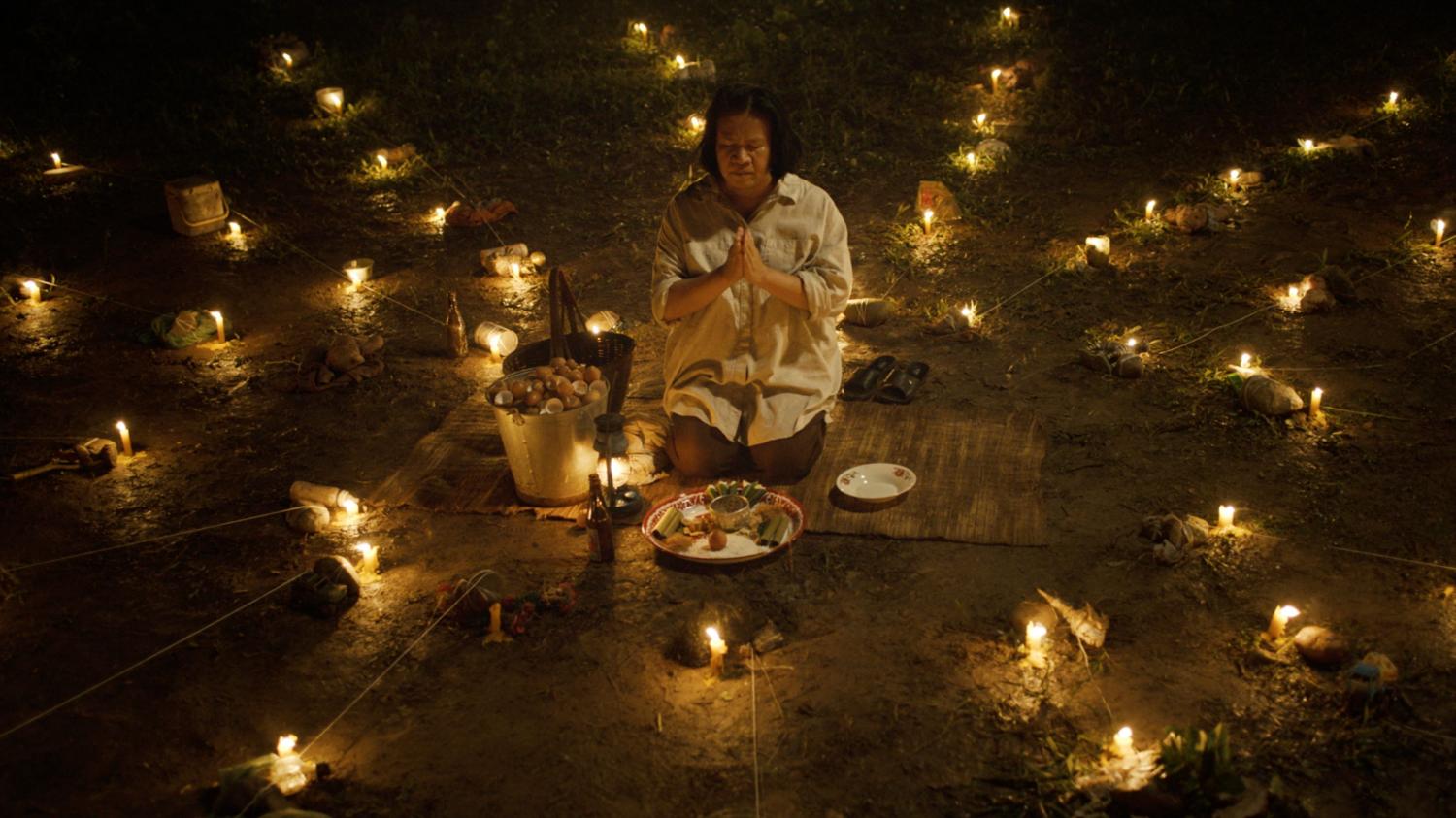Like a session of cinematic séance, Rang Zong (The Medium) channels a cemetery-sized roll call of classic horror elements. The film, recently picked as Thailand's representative for the Oscar's International Feature, is proudly possessed by the ghosts of The Exorcist, The Blair Witch Project, the Paranormal Activity franchise, and Ari Aster's Midsommar, but with Southeast Asia's earthy voodooism, plus a serving of Korean-style blood-and-viscera gore as well as an icing of zombie scare-aesthetics. It's a full-course buffet of fright tricks, complete with an apocalyptic, 30-minute-long exorcism orgy that leaves no spell unuttered and no human unpossessed. All of this is couched in a faux-documentary setup, with handheld shots, grainy CCTV footage and characters speaking directly to the camera.
It's a bit of a mouthful. But is it terrifying? The simple answer is: Yes. It's easy to find faults with the film's choice of form, its anthropological accuracy and the behaviour of some characters, but as a fearmongering machine, it's quite a specimen. The Medium is directed by Banjong Pisanthanakun, the filmmaker of Shutter (2004) and Pee Mak (2013), which is still the highest-grossing film of all time in Thailand. The new film was made in collaboration with Korean producer Na Hong-jin, whose 2016 supernatural thriller The Wailing reigns as a modern landmark of Asian horror, the thematic influence of which is visible in The Medium.
Set in the Northeast (Loei province, to be exact), The Medium taps into the dark underbelly of folk belief and animist rituals. The narrative follows a group of documentary filmmakers who in turn are following a middle-aged shaman called Nim (veteran theatre actor Sawanee Utoomma), whose family has served as a corporeal vessel for the local deity called Bayan. Nim is a shaman who approaches her job with spiritual dignity -- she doesn't give out lotto numbers or pretends to have a superpower, which is normally expected. But in that rural district with a sky the colour of ash, things take a sinister turn when Nim's young niece, Mink (Narilya Gulmongkolpech, in her first film role), begins to act out weird tics and manifest disturbing violence, carnal aggression, and finally, full-blown Linda Blair theatrics, minus the levitation. Eyes crossed and head flopped, Mink is possessed, that much we know. But by what? Bayan, the benign goddess, or something more vile?

Sawanee Utoomma plays a shaman.
The Medium builds its momentum with moody restraint and atmospheric creep; this is not a feast of jump-scare and hammering sound effects. The pseudo-documentary framing device is a subject of much debate, especially since the heyday of found footage and CCTV horror is safely behind us. That what we're watching is what the "filmmakers" are filming adds a layer of voyeuristic subterfuge, though the artifice is deliberately not-so-subtle here. The Medium didn't set out to fool us that it's a documentary -- instead, it wants us to know that we're watching a fake doc and recruits us as willful accomplices in the storytelling scheme.
About halfway in, Mink is taken over by the dark force, and the film shifts gear. We're now in the territory of lurid horror, morbid filth and hellish carnage as Banjong mines a catalogue of black magic iconography and animist superstition (creepy talismans, smashed-up shrines, and Mink's horrid collection of tampons and used condoms). Monks are absent; likewise, Catholic priests, even though this Isan village has a church. So Nim, in an attempt to save Mink, enlists the help of a witch doctor (Boonsong Nakphoo), and together they prepare an epic exorcism rite that makes up the prolonged climax of the film, an unleashing of howls and blood and all the scare techniques in the book. Love it or hate it, terrifying or ridiculous, the choreographed pandemonium at the end of The Medium guns for a kind of grandiose macabre that could make or break a film.

International critics will not hesitate to tag The Medium as the latest example of "folk horror" -- think Robert Eggers' The Witch or Ari Aster's Midsommar. But Southeast Asian horror has always been folk horror. It's our default mode, our modus operandi, it's what audiences in this part of the world grew up with -- think Nang Nak or Pontianak as classic examples, or more recently, Joko Anwar's Satan Slaves, Syamsul Yusof's Munafik and Emir Ezwan's Roh. It doesn't matter if a film comes from a Buddhist or Islamic country, because evil knows no religion. Banjong's The Medium slightly amps up that tradition with a self-conscious visual language and, in the third act, a narrative remorselessness that may remind some of us of Korean thrillers.
So yes, it's terrifying and relentless. It's why we pay to see horror movies in cinemas. But what The Medium doesn't quite offer is depth in portraying spiritual corruption. What is scary in the film works mostly because of its precise control of sound, image and cutting, not because it rattles our conscience and warns us of the futility of faith, which is the scariest feeling of all. It's fair to raise this point since the film seems to want to explore it -- the idea that we, Buddhists, Christians or animists, may not be able to outsmart the dark force that lurks around us. But along the way, the film chooses narrative and technical effectiveness over the possibility to plumb the bigger question. If The Medium, through Mink's transformation, reminds you of The Exorcist (it will), that's because you're made to see her vomit, to see her bedevilled eyes and the spectacle of her demonic possession, and not because the film threatens your soul, your spiritual security, or makes you question your belief in God, in Buddha, or in the triumph of good over evil. That may come at another time in another film.
- Rang Zong (The Medium)
- Starring Narilya Gulmongkolpech, Sawanee Utoomma, Sirani Yankittikan, Boonsong Nakphoo
- Directed by Banjong Pisanthanakun

